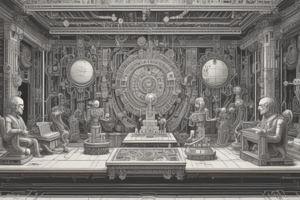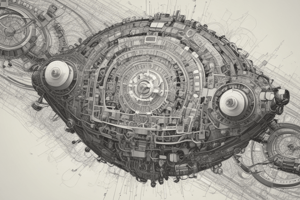Podcast
Questions and Answers
What is a formal language in the context of computer science and mathematics?
What is a formal language in the context of computer science and mathematics?
- A precisely defined set of strings over a given alphabet (correct)
- An infinite set of symbols over a given alphabet
- A loosely defined set of characters over a given alphabet
- A random sequence of symbols over a given alphabet
In the context of formal languages and automata theory, what does an alphabet refer to?
In the context of formal languages and automata theory, what does an alphabet refer to?
- A never-ending set of symbols used for computation
- A finite set of symbols from which strings are constructed (correct)
- A set of symbols with no specific use
- A collection of symbols used for natural language processing
What are strings in the context of formal languages?
What are strings in the context of formal languages?
- A sequence of symbols taken from the alphabet (correct)
- A collection of random symbols
- An infinite sequence of symbols
- A set of symbols with no specific order
What do the rules or grammar determine in the context of formal languages?
What do the rules or grammar determine in the context of formal languages?
What is an example of an alphabet?
What is an example of an alphabet?
What are regular languages defined by?
What are regular languages defined by?
What type of automata can recognize regular languages?
What type of automata can recognize regular languages?
What is the key difference between regular and non-regular languages?
What is the key difference between regular and non-regular languages?
What type of automata can recognize non-regular languages?
What type of automata can recognize non-regular languages?
What is used to define non-regular languages?
What is used to define non-regular languages?
Flashcards are hidden until you start studying
Study Notes
Formal Language in Computer Science and Mathematics
- A formal language is a set of strings composed from a specified alphabet defined by formal rules.
- It serves as a foundational concept in computer science, particularly in programming, algorithms, and automata theory.
Alphabet in Formal Languages
- An alphabet refers to a finite set of symbols used to construct strings in formal languages.
- Examples of alphabets can include binary digits {0, 1} or letters from the Latin alphabet {a, b, c, ..., z}.
Strings in Formal Languages
- Strings are sequences of symbols drawn from an alphabet.
- They can vary in length, including an empty string, which contains no symbols.
Rules or Grammar in Formal Languages
- Rules or grammar specify how strings in a formal language can be formed.
- They define the valid syntactic structure and combinations of symbols within the language.
Example of an Alphabet
- An alphabet could be {0, 1} for binary strings or {a, b} for a simple character-based language.
Regular Languages
- Regular languages are defined by regular expressions or finite automata.
- Their structure allows them to be recognized by machines that process input in a linear manner.
Automata Recognizing Regular Languages
- Finite automata, both deterministic (DFA) and non-deterministic (NFA), can recognize regular languages.
Key Difference: Regular vs. Non-Regular Languages
- Regular languages can be represented by finite automata, whereas non-regular languages require more complex computational models, such as pushdown automata.
Automata for Non-Regular Languages
- Pushdown automata can recognize non-regular languages, particularly those with nested structures, like balanced parentheses.
Definition of Non-Regular Languages
- Non-regular languages are defined using context-free grammars or through properties that finite automata cannot capture, such as the pumping lemma for languages.
Studying That Suits You
Use AI to generate personalized quizzes and flashcards to suit your learning preferences.




